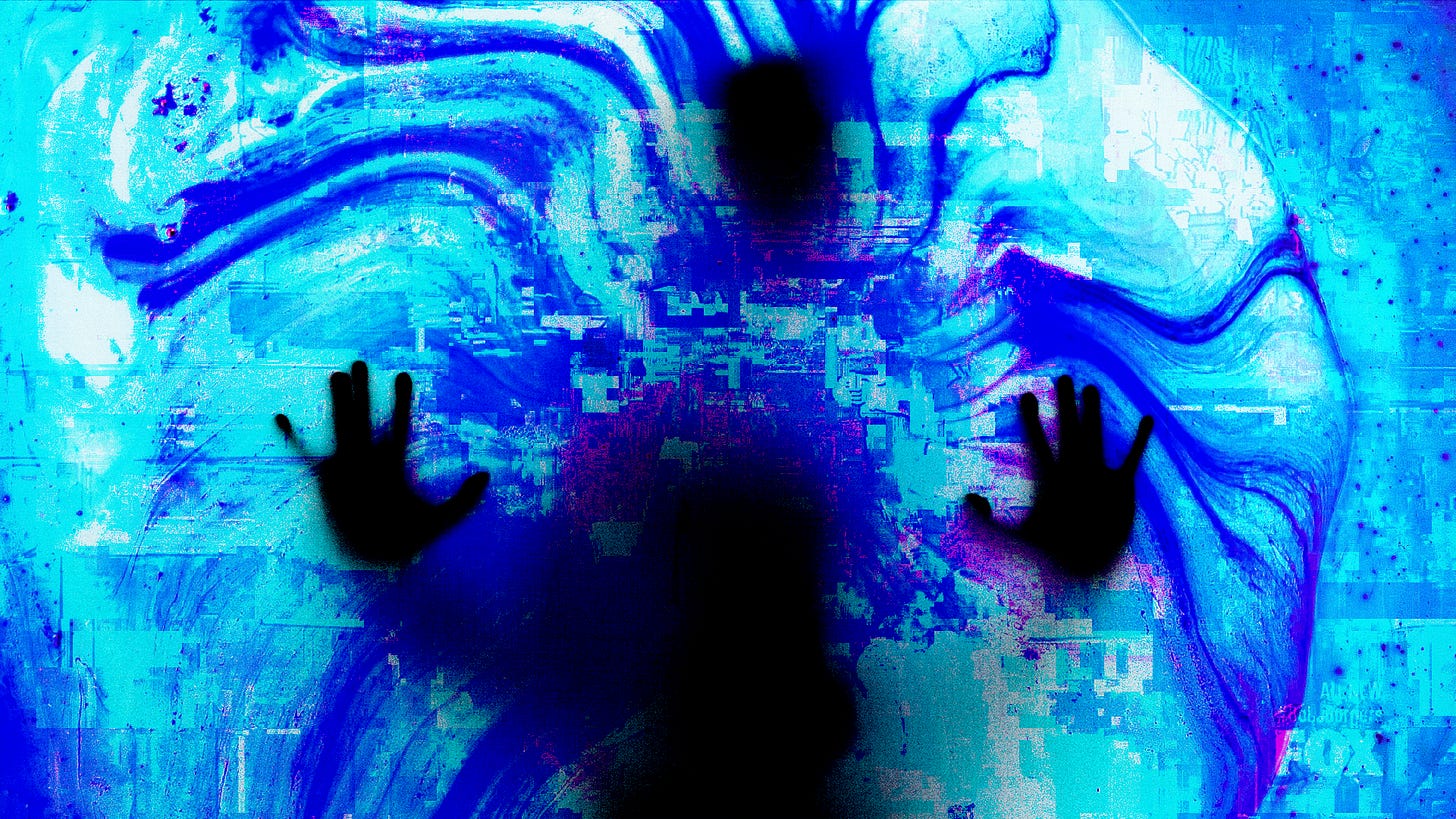Do You Have Sad Attacks, Too?
I knew I couldn't be the only one. PLUS: three mental illness memoirs you should read
CW: self-harm
It starts with heaviness, like my insides are made of ultra-dense rock.
A distance stretches out between me and the world. Comprehension ceases. Despair drops in, then those physically painful, full-body sobs. I start to think about where all the knives are in the house, dig my fingernails into my arm instead.
This lasts from thirty minutes to an hour, and I tend to find the nearest bathroom, turn off the lights, and lay on the cold tile until I’ve cried so much that I am tired enough to sleep. I wake up the next day feeling like I’ve been hit by a bus.
It’s not exactly a panic attack — I’ve had those too, and there’s a difference (numb hands and face, that rollercoaster drop feeling in your stomach). But the suddenness is very similar, and benzodiazepines help, too, so I call them sad attacks.
I’ve been having sad attacks since I was young, but managed to hide them from almost everyone except my live-in partners. When I finally started seeing psychiatrists in my late 20’s, I felt if I just told them everything, if I just gave them enough information, they would know what to do.
But actually, none of them knew what the fuck I was talking about.
I wondered if it had anything to do with being autistic, so one day I googled ‘autism sad attack reddit’, and a post came up titled Who has heard of depression attacks?
A depression attack (as mention to date only reported amongst autistics, and only recently), is much like a panic or anxiety attack but with despair. A very accute, very intense state of depression. As such is dangerous. Even though usually only around 30mins in duration, the individual is at high risk of self harm or an impulsive suicide attempt (ie: no planning or means). From my own experience and those I've heard from other most of us isolate and spend the attack fighting the desire to end it all. After it passes you feel back to normal so really easily mistaken as being attention seeking or overly dramatic if you try to get help in the moment or discuss it after. Obviously, this makes future attacks even more dangerous because you don't seek help. Verbal and aural communication becomes virtually impossible. It also seems most people don't remember much afterwards. They know they had one but if someone asked what someone said to you and your response the memory just doesn't seem to be there. Written communication doesn't seem to be affected in the same way as verbal. Though anything much beyond yes/no questions still may be a problem.
In a follow-up post, OP attributes the concept to the British autism researcher Tony Attwood,1 who wrote a CBT self-help book in 2016 for autistic people struggling with depression.
Attwood writes that the depression attack2 could be caused by a combination of suppressing emotion and struggling to be aware of your own feelings, which then build up and acutely explode:
“…there is no prior warning. The overwhelming despair may occur as a catastrophic emotional overreaction to what appears to be a relatively innocuous negative experience, such as making a minor mistake, being late or being teased. However, there may have been a backlog or build-up of despair over a long time that was not cognitively recognized by autistic adult or others. This final, simple event or trigger releases the pressure that has been building for so long. The cap could not stay on the bottle any longer. The resulting conspicuous despair is very deep and genuine, and entirely unanticipated.”
I did some more digging, and found that Attwood is not the only doctor to notice this phenomenon.
A Japanese psychiatrist named Hosinobu Kaiya had a similar idea in 2016. He wrote up a case study of five patients who suffered from what he called ‘anxious-depressive attacks’, which one subject described like this:
“I was attacked by a sudden emergence of loneliness and sadness without any reason, followed by bad memories from the past. My mind was occupied by an idea that I must pay for my sins with my death. I felt my heart pounding. I was looking at my left wrist and visualizing myself cutting it. The image made me cry aloud “No! No! No!” I began to feel that I was nearly going mad.”
There is no mention of autism, although some of the cases describe what many would recognize as autistic traits:
“As an infant, she…exhibited severe fear of strangers. In junior high school, she experienced social anxiety, avoided public speaking, and was ridiculed by her classmates.”
“she had a tendency to develop social and generalized anxiety and had trouble in adjusting to her surroundings”
“she coped with the [attack]…by going through her favorite books”
Kaiya writes that the anxious-depressive attack consists of three things, in order:
“sudden outbursts of negative emotions incongruent to the conditions of the place, rumination of intruding unpleasant memories, and finally, behavioral reactions to these painful feelings and thoughts, including self-harm.”
He also notes that, while patients rarely bring up these attacks, when asked directly if they experience them, it’s not uncommon, affecting 43% of patients in the anxiety clinics where he conducted his research.
Rumination is a central feature of Kaiya’s anxious-depressive attacks, and in more recent work, he has also linked them to rejection sensitivity. Contrary to the claim that it’s unique to autistic people, Kaiya writes that it’s ‘trans-diagnostically seen’ in everything from depression to OCD to schizophrenia.
I always hesitate to say something is unique to autistic people, since human behavior exists on a continuum, and we are just humans, after all — but if sad attacks are tied to rumination, it would make a lot of sense that people with sticky, perseverative brains are more likely to experience them.
Over the years, I’ve learned to distract and sedate myself to cope with sad attacks instead of self-destructing.3 This is more or less the advice that Attwood gives when he recommends making a safety plan for these dangerous attacks of sudden despair:
reach out to someone so you’re not alone
use a special interest as ‘an off-switch’ for the sad attack
retreat to a safe, quiet place
give yourself time to move through and process the emotions
He also includes a few recommendations for supporting someone through a sad attack:
don’t try to make conversation
don’t try to fix it
don’t ask what’s causing it
validate and listen
remind them that it will pass soon
Three Mental Illness Memoirs To Read Instead of Unshrunk
In March I critiqued Unshrunk by Laura Delano, and it has so far been one of my most popular posts of the year.
Since I personally love the mental illness subgenre of memoir, I thought I would follow up with a few favorites from my shelf that offer some interesting counterweights to Delano’s work, too.



